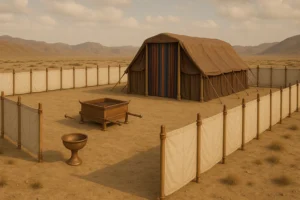The Parasha
Finally the long narrative of the construction of the Tabernacle [the Sanctuary] – to which the Torah devotes more space than any other single subject – is at an end. The building, its frame, drapes and sacred furniture, were complete… The Torah in Exodus 39:43 states “Moses saw all the work, and behold – they had done it just as the Lord had commanded. So Moses blessed them.”
The blessing Moshe gave
The Tabernacle was a micro-cosmos, a universe-in-miniature. In creating the universe, God made a home for humanity. In building the Sanctuary, humanity made a home for God. What, though, was the blessing Moses gave?… “May it be God’s will that His Presence rests in the work of your hands.”
Only one psalm is attributed to Moses: Psalm 90. It ends with the verse “May the pleasantness of the Lord our God be upon us”… This must be understood as the prayer/blessing he [Moshe] pronounced on the completion of the Tabernacle.
When Moses said [this] he meant: “May it be God’s will that His Presence rests in the work of your hands.”
The implication of the blessing
There is a hint here of a principle that has immense implications for the entire structure of Judaism. It is not objects that are holy. It is human action and intention in accordance with the will of God that creates holiness.
Imagine two Torah scrolls, one written with the requisite intention and sanctity, the other written by an atheist. One is to be held in the highest possible sanctity, and the other has to be burned… Holiness is not a property of objects… It is the commandments that make us holy: nothing else.
Only acts of heart and mind can endow them with holiness.
The deep meaning of the blessing
That is the deep meaning of Moses’ blessing to the Israelites: “May it be God’s will that His Presence rests in the work of your hands.”… God’s Presence lives in “the work of our hands” – whatever we do in accordance with His will. What made it holy was one thing only, that the Israelites “had made it just as the Lord had commanded”. The simplest human act, if done for the sake of God, has more sanctity than the holiest of holy objects.
The above excerpts/quotes are provided by Emor precisely as they appear in the original source, without any modifications or corrections to typos. Text within square brackets, as well as subtitles and bold formatting, are added by Emor for emphasis, clarification, or commentary, and the original content has not been changed.

